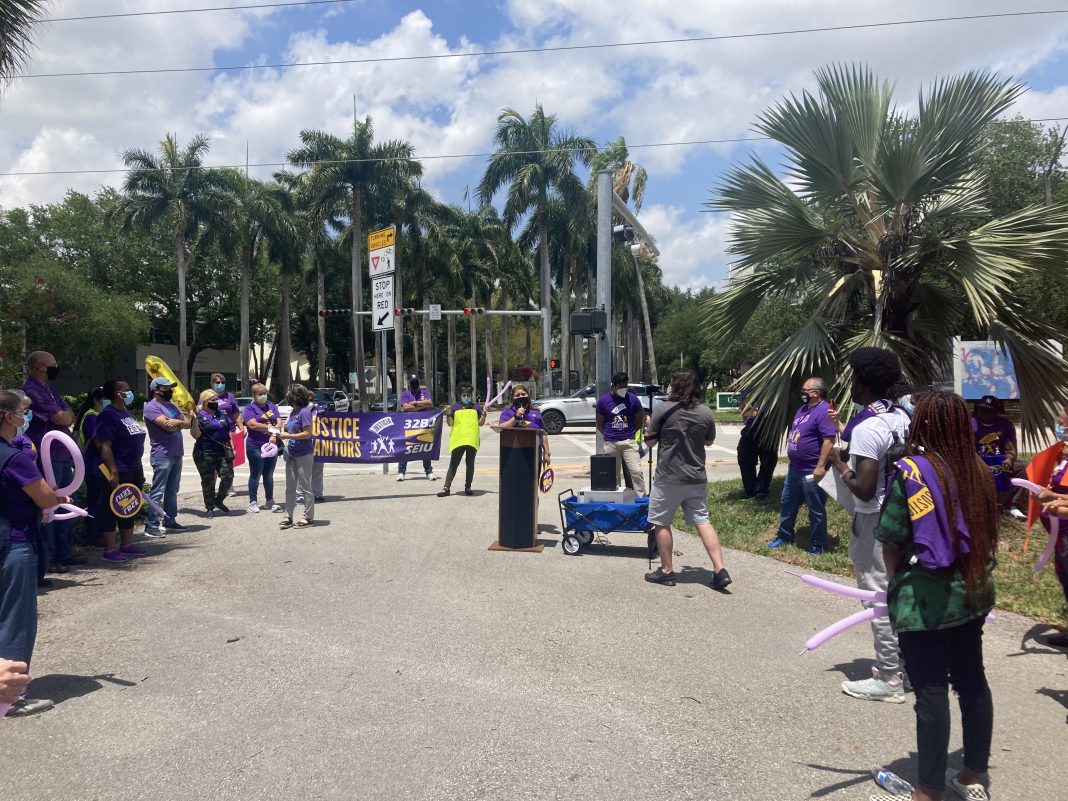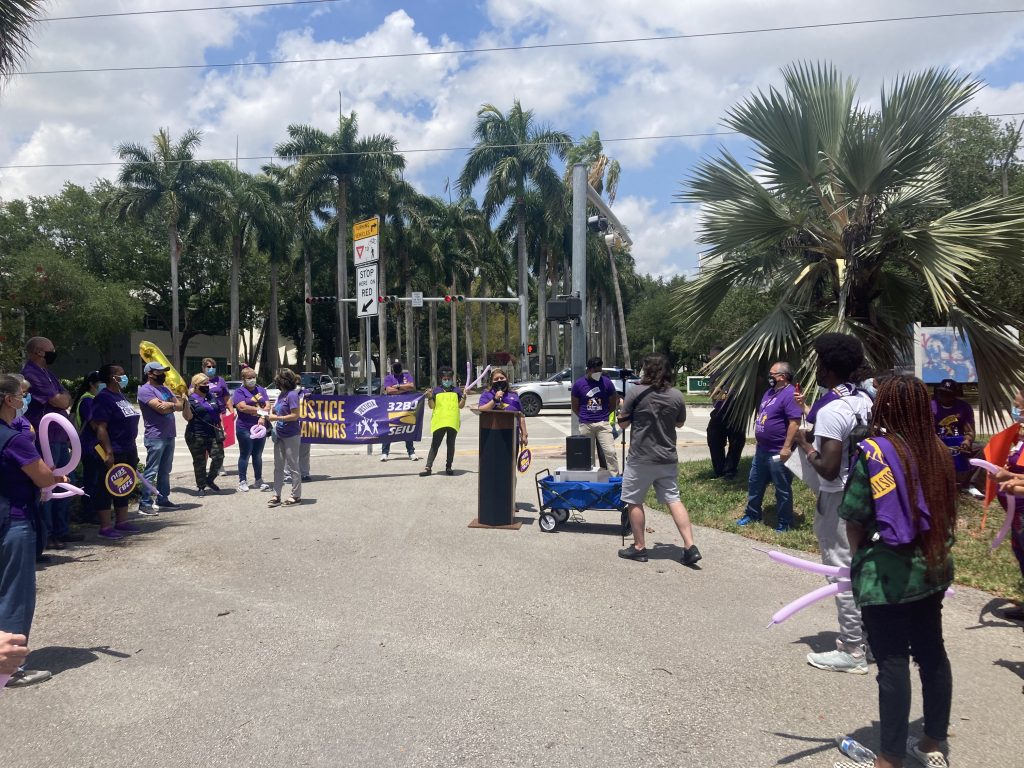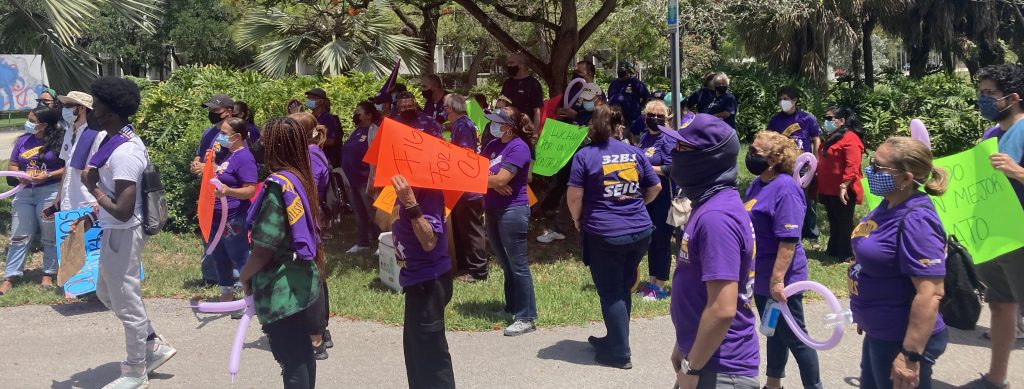

Essential workers at the University of Miami held a protest Friday at UM’s main entrance to demand higher wages and better working conditions as the university’s contracts with food and custodial service providers near expiration.
“We are fighting for a new contract, for dignity, for a better salary since the majority of us are only earning a minimum wage salary or just a little over Florida’s minimum wage, and we simply do not think it is enough to sustain ourselves and our families,” said Odeimi Melendres, a janitor at UM’s medical campus who has worked at the university for over five years.
Melendres and other workers at the protest spoke in Spanish throughout the demonstration.
Workers, students, union leaders and local politicians delivered impassioned speeches to a roaring crowd of supporters directly across the street from UM’s main entrance on Ponce de Leon Boulevard. Speakers included Miami-Dade County District Five Commissioner Eileen Higgins and Dwight Bullard, a former Florida state senator turned senior political activist for Florida Rising.
“I just wanted to be in support, in solidarity with the workers because I understand and appreciate what it is they’re trying to get done,” Bullard said in an interview hours after the protest. “When you put out a bid for a services contract, of course you’re trying to get the best price, but you don’t necessarily have a vested interest in how those folks compensate the workers they employ.”
UM and its facility service providers, ABM and Chartwells, were at the center of the, protest attended by several dozen UM community members. Bullard says that Chartwells especially has been underpaying its workers for several years.
“Chartwells has gotten away with, really, kind of undercutting their workers,” Bullard said. “It’s time for Chartwells and the University of Miami to recognize where we are as a state and recognize how people are living in a place like Miami.”
Bullard says that UM and Chartwells must work together to provide workers with better contract provisions and wages.
“The workers that are contracted to serve food and clean buildings and clean classrooms want to be able to experience some semblance of the American dream,” Bullard said.
“Ideally, when the system’s working right, someone who’s cleaning a classroom now can know that maybe one day their son or daughter or maybe themselves can go to the University of Miami and earn a degree.”
UM’s unionized workers are members of the Service Employees International Union Local 32BJ branch, which organizes and advocates for workers throughout the eastern United States. Protesters outfitted in shirts demanding “Justice for Janitors” waved banners and banged drums to chants from the incensed crowd.
“¡Candela Candela, aquí no habrá candela!” or “Flames, flames, here there won’t be flames!” rang through the air following an impassioned speech from one student protester.

Helene O’Brien, the Florida Director for 32BJ SEIU and a community organizer for 32 years, says that contract negotiations between Chartwells and UM have yet to officially begin. She expects the process to start this summer and is hopeful a fair agreement can be reached by sometime around when students return in August.
“By the time students start coming back hopefully it will either be resolved or when the students come back they’ll help us resolve it,” O’Brien said.
Throughout the last year, O’Brien says, essential workers at UM have gone to work everyday risking their lives to a deadly and little-understood disease without receiving hazard pay or the possibility of paid leave. She believes that the UM community must be informed to help secure higher wages for essential workers.
“It’s a pretty big year, you know coming off of COVID, a year of many of them working, many of the cafeteria workers being out for months, many of them facing all kinds of risks, health risks,” O’Brien said.
“Many people don’t know that their average wage is $10.60 an hour, you know, I don’t think that the faculty or even administration are really aware of that, they just know how much they pay the employer for the contract, so this is really to educate the community as well,” she continued.
When asked for comment, UM gave the following statement from Chartwells Resident District Manager Michael Ross:
“Our associates are important to us and the smooth operation of the food service on campus. We care for and value each of our associates. Chartwells will negotiate in good faith with the members of SEIU local 32 BJ.”
Facility solutions provider ABM, which has provided UM with its custodial staff since 2014, issued the following statement:
“We value our team members and their dedication to making a difference every day for the students, professors and staff at the University of Miami. We appreciate our long-time partnership with UM and SEIU Local 32 BJ. We are committed to working with the union to negotiate in good faith an agreement that is fair to team members and the UM community.”
Many student protesters and members of the University of Miami Employee Student Alliance (UMESA), an unofficial organization of students and workers created to fight on behalf of workers at UM, say that it is the responsibility of UM President Julio Frenk to be vocal and visible in the fight for increased wages.
“I would tell them to actually pay these workers a living wage, to actually put pressure on ABM, on Chartwells and on other contracted services, and for Julio Frenk to actually live up to his message that he preaches of community service,” said UM alumni David Beltran, 26, a worker for the We Count worker center in South Miami-Dade County.
“During the pandemic, students, administrators, professional staff of the university have had the opportunity to take days off, many of them have had the time to work from home, and many of these workers do not have the possibility to work from home, and they have not received any sort of hazard pay or any sort of bonus.”
Mars Fernandez, a graduate student at UM studying counseling psychology and an active member of UMESA, echoed Beltran’s demands and urged President Frenk to be more transparent with both students and workers.
“He has evaded workers when they’ve asked to communicate with him, they’ve shown up at his office sending letters, petitions, even outlining how they’ve been abused by supervisors,” Fernandez said. “You just push the dirty work off on these companies that we subcontract with, who are notorious for their ill-treatment of workers or poor treatment of workers, low pay, and it’s pretty much the opposite of any rhetoric about a culture of belonging that you espouse.”
The protest was also attended by workers from across South Florida, including several from the Miami International and Ft. Lauderdale Airports. In February of this year, the Miami International Airport terminated its contract with Eulen America, a subcontracted services provider responsible for supplying the airport with many of its essential workers.
SEIU Florida Director O’Brien says that janitors at UM were instrumental in orchestrating the organization of the airport’s essential workers.
“The fact that you have a county commissioner coming here is because the workers here have such a profound influence on what happens in the county, in South Florida, they have a union contract,” O’Brien said.
Jilma Guevar, a Miami International Airport essential worker and union leader, affirms that she attended the protest to help the cause of workers everywhere.
“For us, it was very hard to have to fight for our own rights as workers because we knew we had to show up to work, and if we had to go to the doctor, we did not have medical insurance,” Guevar said. “People from here have their benefits, but they also have to be able to keep those benefits. We are supporting them because they supported us in our fight to have a union to advocate for our rights.”





